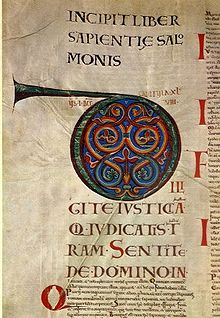
O Sapinetia quae ex ore Altissimi prodiisti, attingens a fine usque ad finem, fortiter sauviterque disponens omnia: veni ad docendum nos viam prudentiae.
O Wisdom, you came forth from the mouth of the Most High, and reached from end to end, and disposed of all things sweetly and mightly: come and teach us the way of prudence!
You can hear the Great O Antiphons here...
I absolutely love this part of Advent as our liturgical sensibility starts to be centrally focussed on the birth of the Savior, Emmanuel. At Vespers the antiphon for the Magnificat hymn in the Divine Office shows us the solemnity of the next days. The first antiphon is noted above in Latin and in English. Each of the antiphons appeals to the Old Testament types given to tell of the coming of the Messiah. The OT typology indicates the new dispensation of grace. Today, we ask for a new sense of prudence rooted in Christ.
And NOW we are able to sing the famous Advent hymn O Come, O Come Emmanuel. It is only tonight that singing the hymn makes any real sense as opposed to singing it when Advent begins, a common mistake.
I was reading a bit on Advent in Father Pius Parsch's The Church's Year of Grace:
"Come, teach us the way of prudence! What an all-embracing petition! Make us perfect Christians, Christians who are wholly penetrated --mind, will, and emotions-- with the leaven of Christianity. Make us true Christian personalities who combine strength with gentleness. Make us strong in battle against hell, the world and self; make us glow with the love of God and neighbor! Enable us to show virile courage, and heroism unto martyrdom. Enable us to show the virgin gentleness and sweetness of a bride. In this sense we pray, "Thy kingdom come!" All this is part of our yearning plea, Come! teach us the way of prudence.
From Abbot Prosper Louis Paschal Guéranger, OSB's Liturgical Year:
The Church enters to-day on the seven days which precede the Vigil of Christmas, and which are known in the liturgy under the name of the Greater Ferias. The ordinary of the Advent Office becomes more solemn; the antiphons of the psalms, both for Lauds and the Hours of the day, are proper, and allude expressly to the great coming. Every day, at Vespers, is sung a solemn antiphon, consisting of a fervent prayer to the Messias, whom it addresses by one of the titles given Him in the sacred Scriptures.
In the Roman Church's liturgy, there are seven of these antiphons, one for each of the greater ferias. They are commonly called the O's of Advent, because they all begin with that interjection. In other Churches, during the middle ages, two more were added to these seven; one to our blessed Lady, O Virgo virginum; and the other to the angel Gabriel, O Gabriel; or to St. Thomas the apostle, whose feast comes during the greater ferias; it began O Thorna Didjme.
There were even Churches where twelve great antiphons were sung; that is, besides the nine we have just mentioned, O Rex Pacifice to our Lord, O mundi Domina to our Lady, and O Hierusalem to the city of the people of God.+The canonical Hour of Vespers has been selected as the most appropriate time for this solemn supplication to our Saviour, because, as the Church sings in one of her hymns, it was in the evening of the world (vergente mundi vespere) that the Messias came amongst us.
These antiphons are sung at the Magnificat, to show us that the Saviour whom we expect is to come to us by Mary. They are sung twice, once before and once after the canticle, as on double feasts, and this to show their great solemnity. In some Churches it was formerly the practice to sing them thrice ; that is, before the canticle, before the Gloria Patri, and after the Sicut erat.
Lastly, these admirable antiphons, which contain the whole pith of the Advent liturgy, are accompanied by a chant replete with melodious gravity, and by ceremonies of great expressiveness, though, in these latter, there is no uniform practice followed. Let us enter into the spirit of the Church; let us reflect on the great day which is coming; that thus we may take, our share in these the last and most earnest solicitations of the Church imploring her Spouse to come, to which He at length yields.


Leave a comment